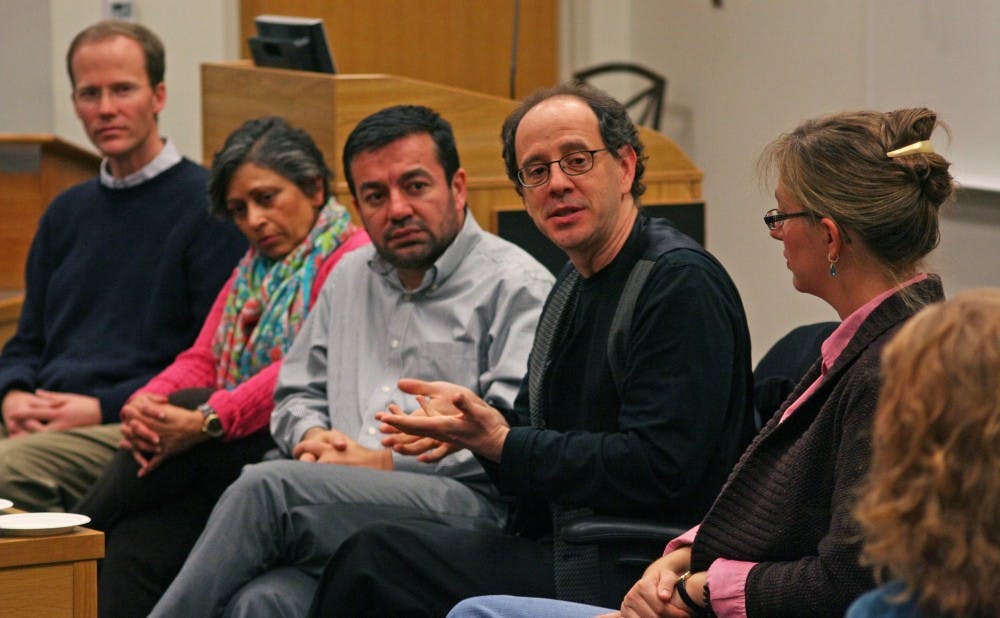A panel comprised of campus religious leaders and medical experts discussed the connections between faith and mental well-being at an event Tuesday evening.
The panelists shared their perspectives on mental health and how they feel faith and medicine should relate when addressing mental health problems. The event—entitled “Faith and Mental Well-Being”—was presented by the Undergraduate Faith Council and moderated by Christy Lohr Sapp, associate dean for religious life. Panel members represented a wide variety of faiths and backgrounds and used their experiences to emphasize the diversity of opinions in their fields.
“If you are the person people turn to for support, oftentimes, your own vulnerabilities are not welcome anymore,” Muslim chaplain Abdullah Antepli said. “People come to you and expect you to have it figured out. Clergy rates of depression are much higher than the national average.”
Antepli discussed the mental health struggles faced by religious leaders and mental health experts, adding that he would describe many chaplains and imams as “wounded healers.”
Hindu chaplain Madhu Sharma noted that many faith leaders do not want to seek professional mental help for fear that doing so will be interpreted as a sign of weakness.
In addition, the panel addressed the issue of striving for perfection, a topic particularly relevant for college students faced with the phenomenon of perceived “effortless perfection.”
Sharma said that seeking perfection is an issue she encounters often in her community. She added that Hindus believe people are made next to God and can be perfect and godlike.
Gary Glass, associate director for outreach and developmental programming for Counseling and Psychological Services, said striving for perfection can be harmful because it can never be achieved.
“You cannot achieve perfection, but that is not because of your inadequacy,” Glass said. “You cannot achieve perfection because, from a faith perspective, that would be becoming God. ...From a spiritual perspective, God is infinite, and we’re never going to catch up.”
Kinghorn responded with a Christian theological viewpoint on the idea of perfection. According to the doctrine of original sin, no one lives a perfect life because all are in need of God’s grace.
All of the panelists stressed the importance of community support in dealing with mental health.
“If you’re hurting, find someone you love, find someone you trust. You don’t want to hurt alone,” Glass said.
The importance of a faith community can also be applicable to Duke students, said Warren Kinghorn, assistant professor of psychiatry and pastoral and moral theology.
“Duke is not the whole world, your job is not the whole world, the relationship that you’re in is not the whole world,” Kinghorn said. “Those things are important, but there’s a larger reality there for you. Faith can help you remember that.”
Undergraduate Faith Council member Hannah Ward, a senior who helped plan the event, said she was pleased with how it played out.
“This is a great event that is really pertinent to many students here at Duke,” Ward said. “It sets a great precedent for future conversations on the incorporation of faith and mental well-being, which we often separate in our minds.”
Freshman Bryce McAteer, a PathWays Chapel scholar, echoed Ward’s statement, adding that the emphasis on perfection resonated with him.
“Understanding that we can be vulnerable, that we can be weak and that at times we may fail, but that things will be okay is the most comforting but also the most profound truth that many students are still struggling to hear,” McAteer said.
Junior Rachael Clark said the event was unique in that it presented a wide range of perspectives.
“A lot of times, events at Duke have the label of ‘interfaith,’ but it’s not inclusive of a lot of the faith traditions that are at Duke,” Clark said. “I really enjoyed the combination of all of the different faith groups represented, as well as looking at the topic from religious and biomedical perspectives, and how all of those things can work together.”
Get The Chronicle straight to your inbox
Signup for our weekly newsletter. Cancel at any time.

